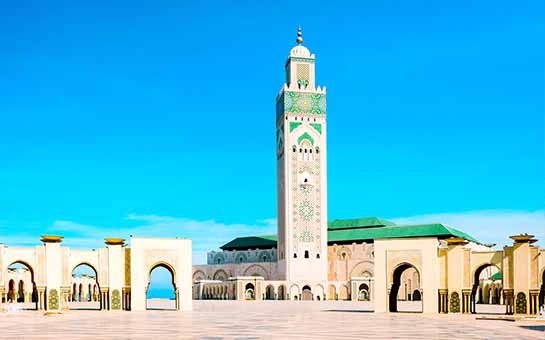The Kingdom of Morocco is a country in the Maghreb region of North Africa, overlooking the Mediterranean Sea to the north and the Atlantic Ocean to the west. The country’s landscape is diverse, featuring both oceans and deserts, as is its climate.
And, if you’re heading to Morocco on a work assignment, you’ve made a good professional (as well as a personal) decision. You’re about to become part of a country that is not only beautiful but also happy, and one which provides a good quality of life for its expatriate population. According to an Expat Insider survey, Morocco ranks 27th among the world’s countries in the personal happiness of expats and 38th in expat quality of life.
Moving to a new country without health insurance is a risky decision. Hence, before you pack your bags for this beautiful country, make sure to buy expatriate health insurance to cover any major healthcare-related expenses you may incur.
Healthcare System in Morocco
The Moroccan healthcare system is quite similar to that of western countries in which the government assumes responsibility for its citizens. The Ministry of Health (MOH) of the kingdom sponsors basic health activities, as well as manages and regulates the health system.
Medical care in Morocco is primarily divided into two sectors, public and private.
Public Healthcare in Morocco
This model is controlled and regulated by the MOH and financed by the public budget. Under this system, the citizens of the Kingdom of Morocco have access to:
- Clinics
- Health centers
- Diagnostic centers
- Public hospitals
- Dispensaries
Moroccan citizens are expected to contribute to the social security system, which covers salaried individuals and their dependents for expenses related to illness, maternity, disability, pensions, and death.
All Moroccans are eligible to receive care in MOH facilities at subsidized rates. However, the MOH enables the poor to obtain a "Certificat d’indigence" to receive free medical care in public facilities.
The social security system is separate for different sectors, and employed Moroccans have to sign up for the "Assurance maladie obligatoire" (AMO). AMO is a mandatory health insurance policy for all employed Moroccan citizens.
The social security systems for different groups of Moroccan citizens include:
- "Caisse nationale des organismes de prévoyance sociale" (CNOPS): Subsidized healthcare for civil servants in the country.
- "Caisse nationale de sécurité sociale" (CNSS): Subsidized healthcare for private-sector employees. This social security system is funded by payments from both the employer and the employee.
- "Régime d’assistance médicale aux personnes économiquement démunies" (RAMED): Free healthcare facilities for lower-income and poor individuals.
Each of these bodies issues an insurance identification card that enables its members and their dependents to benefit from the AMO’s medical care and services.
A visitor in Morocco can take advantage of free emergency medical care at a public healthcare facility if the hospital stay is less than 24 hours.
What does public healthcare in Morocco include?
Public healthcare in Morocco includes:
- Pregnancy, childbirth, and postnatal care
- Optical care
- Paramedics
- Oral health
- Radiology and medical imaging
- General medicine
- Surgical specialties
- Laboratory tests
Who can use public healthcare in Morocco?
- Citizens of Morocco under CNOPS, CNSS, or RAMED
- Expats under CNSS (privately employed) insurance
- French citizens paying in social security in France
The biggest disadvantage of Moroccan public health insurance is that the Moroccan hospitals and other medical facilities mandate upfront payment. After you receive medical treatment, it is your responsibility to coordinate with the insurance company to receive compensation for medical care. It could take days to get the reimbursement.
As an expatriate, you must buy expatriate health insurance for yourself and your dependents to avoid being left with a hefty bill.
Private Healthcare System in Morocco
The hospitals and medical centers at which you are eligible to use Moroccan private health insurance are better developed and more expensive than those in the public healthcare system. The private hospitals are better staffed and more hygienic as compared to the public ones. Most expatriates prefer using private healthcare facilities, due to factors like shorter wait times, better facilities, and experienced healthcare professionals.
Health Insurance Policies in Morocco
Hospitals in both the systems (public and private) mandate upfront payment, except from individuals getting treatment under the RAMED social security system. After your hospital stay, you must apply to get reimbursement from the insurance company, which can sometimes be an added hassle after a medical emergency.
As an expatriate in Morocco, if you have international expat health insurance, your medical treatment cost will be paid through the health coverage you have bought. You may not have to pay out-of-pocket, and neither would you have to chase the local insurance company for reimbursement.
Public health insurance will give you access only to public medical centers, which are often overcrowded and mismanaged. Private health insurance will grant you a better standard of care, shorter waiting times, and allow you to tailor your policy so that you’ll only pay for the kind of coverage you think you will need. For this reason, we recommend purchasing Moroccan expatriate health insurance. Expat health insurance will ensure you get the best medical treatment without paying first and getting reimbursed later.
What does Expat Health Insurance for Morocco Include?
Expatriate health insurance offers the following benefits:
- A platform for 24x7 medical assistance
- Direct payment in case of hospitalization
- Reimbursement of medical expenses at 100% of the actual costs
- Repatriation assistance
- Medical evacuation (to your home country or to a nearby country) during life-threatening treatment or during natural calamities
Moving to Morocco is a good decision, but not unless you have a good expatriate health insurance policy. You can compare several different plans with different benefits and levels of coverage, select the one that best fits your needs, and as easily as that, you’ve ensured yourself peace of mind in a foreign land.
